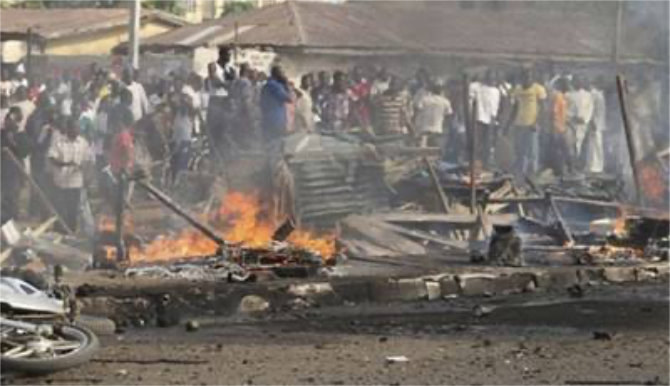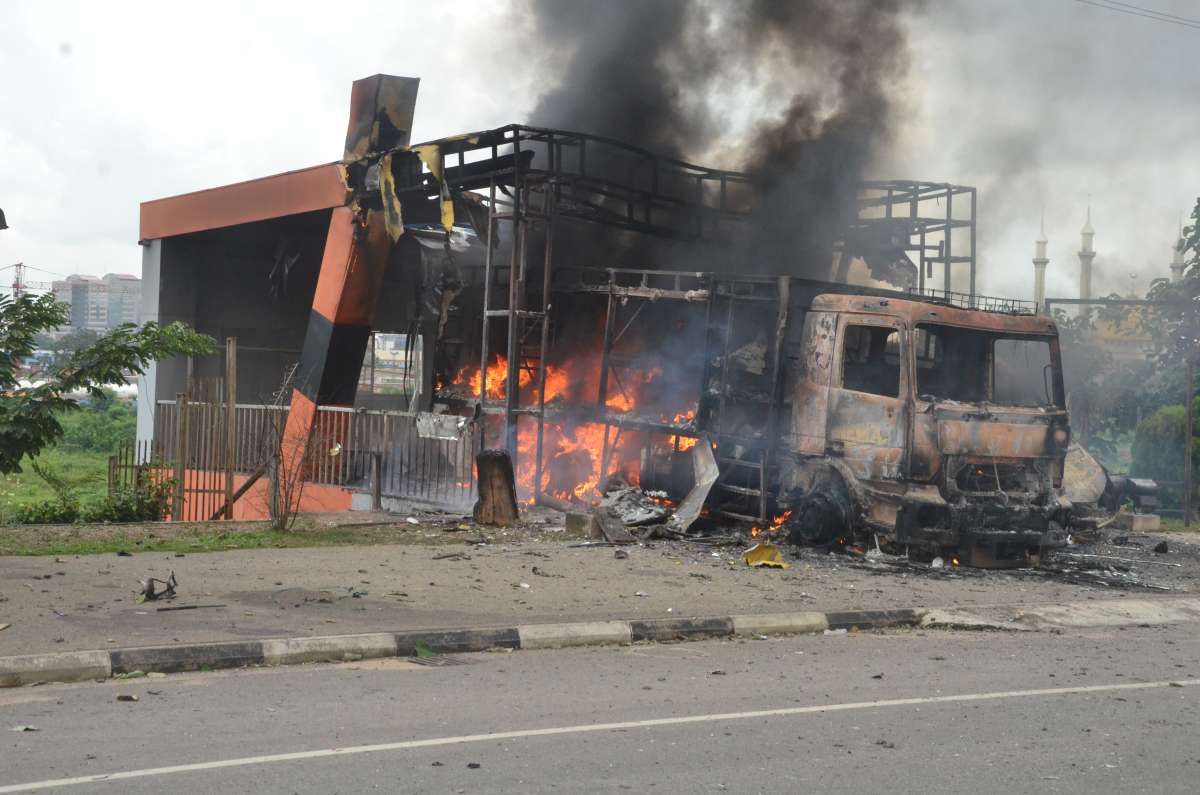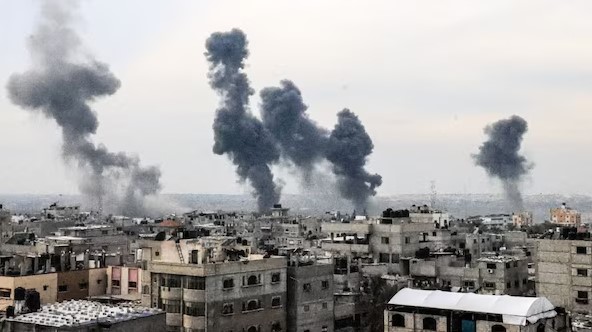In one of three blasts in the town of Gwoza, a female attacker with a baby strapped to her back detonated explosives in the middle of a wedding ceremony…reports Asian Lite News
At least 18 people were killed and 19 seriously wounded in a string of suicide attacks in northeastern Nigeria on Saturday, emergency services said.
In one of three blasts in the town of Gwoza, a female attacker with a baby strapped to her back detonated explosives in the middle of a wedding ceremony, according to a police spokesman.
The other attacks in the border town across from Cameroon targeted a hospital and a funeral for victims of the earlier wedding blast, authorities said.
At least 18 people were killed and 42 others injured in the attacks, according to the Borno State Emergency Management Agency (SEMA).
“So far, 18 deaths comprising children, men, females and pregnant women” have been reported, said Barkindo Saidu, the head of the agency.
Nineteen “seriously injured” people were taken to the regional capital Maiduguri, while 23 others were awaiting evacuation, Saidu said in the report.
A member of a militia assisting the military in Gwoza said two of his comrades and a soldier were also killed in another attack on a security post, though authorities did not immediately confirm this toll.
Boko Haram militants seized Gwoza in 2014 when the group took over swathes of territory in northern Borno.
The town was taken back by the Nigerian military with help from Chadian forces in 2015 but the group has since continued to launch attacks from mountains near the town.
Boko Haram has carried out raids, killing men and kidnapping women who venture outside the town in search of firewood and acacia fruits.
The violence has killed more than 40,000 people and displaced around two million in Nigeria’s northeast.
The conflict has spread to neighboring Niger, Cameroon and Chad, prompting the formation of a regional military coalition to fight the militants.
Extremists from Sahel cross into Nigeria’s north
Extremist fighters who had long operated in Africa’s volatile Sahel region have settled in northwestern Nigeria after crossing from neighboring Benin, a report said Wednesday, the latest trend in the militants’ movements to wealthier West African coastal nations.
The extremists believed to be linked to Al-Qaeda have in the last year crossed over from Benin’s hard-hit northern region and settled in Kainji Lake National Park, one of Nigeria’s largest, where other armed groups have also gained access, according to the report by the Clingendael Institute think tank, which has done extensive research in the Sahel.
Residents close to the park said that the facility, which holds one of West Africa’s fast-declining lion populations, has been closed for more than a year because of security threats from armed groups attacking neighboring villages and roads.
“Before, it was like a tourism center (but) now, people find it difficult to pass through there,” said John Yerima, who lives near the park in New Bussa town. “You cannot enter that road (leading to the park) now. It is dangerous seriously.”
The security situation at the 5,300-square kilometer (2,000-square mile) park in Niger state and along the nearby border with Benin is “getting out of hand” and is “a much more explosive situation than we had anticipated,” said Kars de Bruijne, one of the authors of the report and a senior research fellow at the institute.
The “sustained presence” of the armed groups in the park is the first sign of a connection between Nigeria’s homegrown extremists that have launched a decadelong insurgency in its northern region, and Al-Qaeda-linked militants from the Sahel, the vast arid expanse south of the Sahara Desert, Bruijne said.
Their presence offers an opportunity for the extremists to claim large-scale success in both countries, already wracked by deadly attacks in recent years, he added.
Known as a global hot spot for violent extremism, the Sahel region’s worsening security crisis comes as military coups are toppling democratic governments. As the military governments struggle to contain the violence, they are increasingly severing security with traditional partners France and the United States and turning to Russia for support.
In northwest Nigeria, security analysts have in the past warned that the region’s remote territories, where the government is largely absent but have rich mineral resources and high poverty levels, present an opportunity for expansion for extremist groups that had operated mainly in the Sahel, as well as the Daesh group, whose fighters hold sway in the Lake Chad basin.
“A link between Lake Chad and the Sahel is a major opportunity for Al-Qaeda and Daesh to boast about their profiles as leaders of global extremism,” the report said.
There are also concerns from conservationists that the presence of armed groups in the park could further threaten the remaining lions whose populations have declined as a result of climate change and poaching.
“The security situation has become top of the list when it comes to the concerns about the lion populations in Nigeria,” said Stella Egbe, senior conservation manager at the Nigerian Conservation Foundation.
The Clingendael report said it is unclear what the motive of the Sahel extremists in the park is and what their relationship with other armed groups there will be. Security analysts say it offers opportunities for logistics and more influence amid booming illegal trade across the porous border.
“The Sahelian extremists potentially can try to use northwestern Nigeria as a place for fundraising, for logistics and to try to influence the extremist groups there as part of their own competition,” said James Barnett, a fellow at the Hudson Institute whose works in northwestern Nigeria were cited in the report.
ALSO READ-Jaishankar Promotes Business Opportunities at India-Nigeria Forum










